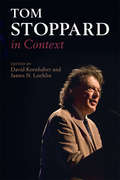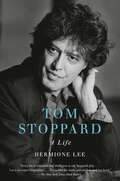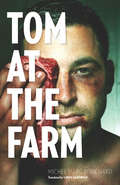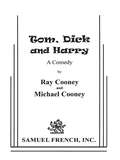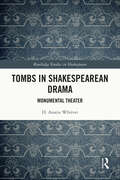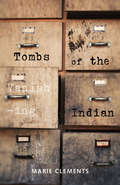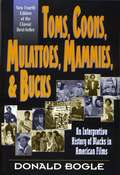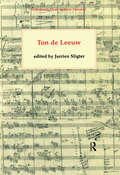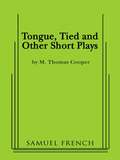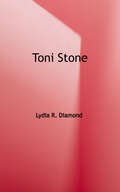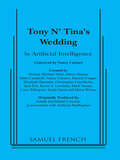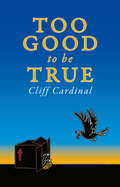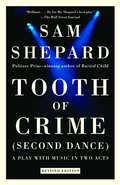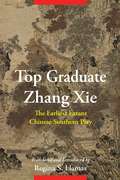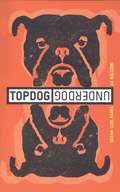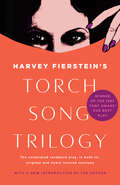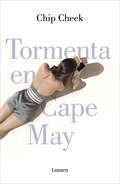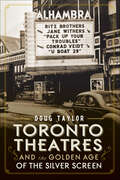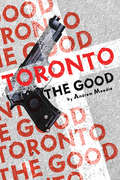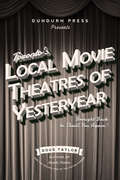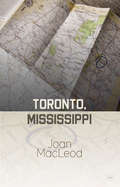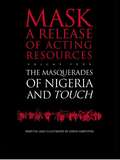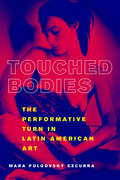- Table View
- List View
Tom Stoppard in Context (Literature in Context)
by James N. Loehlin David KornhaberTom Stoppard's work as a playwright and screenwriter has always been notable for mixing ideas with entertainment. From the early success of Rosencrantz and Guildenstern Are Dead to masterpieces like Arcadia, from radio plays about modern art to the Oscar-winning screenplay for Shakespeare in Love, Stoppard has challenged and delighted audiences with the intellectual and cultural richness of his writing. Tom Stoppard in Context provides multiple perspectives on both the life and works of one of the most important modern playwrights. This collection covers biographical and historical topics, as well as the broad array of intellectual, aesthetic, and political concerns with which Stoppard has engaged. More than thirty essays on subjects ranging from science to screenwriting help illuminate Stoppard's rich body of work.
Tom Stoppard: A Life
by Hermione LeeOne of our most brilliant biographers takes on one of our greatest living playwrights, drawing on a wealth of new materials and on many conversations with himOne of our most brilliant biographers takes on one of our greatest living playwrights, drawing on a wealth of new materials and on many conversations with himTom Stoppard is a towering and beloved literary figure. Known for his dizzying narrative inventiveness and intense attention to language, he deftly deploys art, science, history, politics, and philosophy in works that span a remarkable spectrum of literary genres: theater, radio, film, TV, journalism, and fiction. His most acclaimed creations--Rosencrantz and Guildenstern are Dead, The Real Thing, Arcadia, The Coast of Utopia, Shakespeare in Love--remain as fresh and moving as when they entranced their first audiences.Born in Czechoslovakia, Stoppard escaped the Nazis with his mother and spent his early years in Singapore and India before arriving in England at age eight. Skipping university, he embarked on a brilliant career, becoming close friends over the years with an astonishing array of writers, actors, directors, musicians, and political figures, from Peter O'Toole, Harold Pinter, and Stephen Spielberg to Mick Jagger and Václav Havel. Having long described himself as a "bounced Czech," Stoppard only learned late in life of his mother's Jewish family and of the relatives he lost to the Holocaust.Lee's absorbing biography seamlessly weaves Stoppard's life and work together into a vivid, insightful, and always riveting portrait of a remarkable man.
Tom at the Farm
by Linda Gaboriau Michel Marc BouchardFollowing the accidental death of his lover, and in the throes of his grief, urban ad executive Tom travels to the country to attend the funeral and to meet his mother-in-law, Agatha, and her son, Francis - neither of whom know Tom even exists. Arriving at the remote rural farm, and immediately drawn into the dysfunction of the family's relationships, Tom is blindsided by his lost partner's legacy of untruth. With the mother expecting a chainsmoking girlfriend, and the older brother hellbent on preserving a facade of normalcy, Tom is coerced into joining the duplicity until, at last, he confronts the torment that drove his lover to live in the shadows of deceit.The lover - the friend, the son, the brother, the nameless dead man - has left behind a fable woven of false-truths which, according to his own teenage diaries, were essential to his survival. In this same rural setting, one young man had once destroyed another young man who loved yet another. Like an ancient tragedy, years later, this drama will shape the destiny of Tom.In a play that unfolds with progressively blurred boundaries between lust and brutality, between truth and elaborate ?ction, Bouchard dramatizes how gay men often must learn to lie before they learn how to love. Throughout 2011 and 2012, Tom at the Farm was produced in Quebec and France, as Tom à la ferme, and in Mexico, as Tom en la granja. Award-winning Quebec director Xavier Dolan adapted the play for the screen in 2013, with Caleb Landry Jones in the leading role.
Tom, Dick & Harry
by Ray CooneyIn this hilarious story of three brothers, Tom and his wife are about to adopt a baby. His brothers are anxious to help make a good impression on the woman from the agency who has arrived to check on the home and lifestyle of the prospective parents. Unfortunately Dick, who has stashed boxes of smuggled brandy and cigarettes in the house, and Harry, who is in possession of a cadaver he is planning to sell illegally to a medical school, fail miserably. The adoption agency representative is aghast - and the illegal Croatian aliens who do not speak English are no help at all!
Tombs in Shakespearean Drama: Monumental Theater (Routledge Studies in Shakespeare)
by H. Austin WhitverTombs in Shakespearean Drama explores the rhetorical deployment of tombs and monuments on the early modern stage, demonstrating their historiographic power and mythmaking potential. By analyzing references to tombs in plays by Shakespeare and others in conjunction with extant monuments, this volume demonstrates how these references function in two overlapping ways in period drama: monuments act as repositories of information about the past, and they allow the living to construct and preserve fictive narratives. The stage exposes the flimsy materiality of paper, placing less value on the written word than period poetry. In this way, critics have perhaps oversold as universal Shakespeare’s poetic praise of stone. Tombs within plays act as a powerful historical and narrative medium, raising the stakes to provide the stage with the illusion of permanency. Playwrights use tombs to anchor the stage action, giving a sense of lasting importance to dramatic events and combatting the ephemeral nature of the playhouse. In drama, Shakespeare and others drew on the persona preserved on tombs; this volume widens our view of how these representations interacted in the commemorative economy of early modern England. Within the playhouse, it was the tomb, not the tome, that stood as a symbol of permanence.
Tombs of the Vanishing Indian
by Marie ClementsThree young Native American sisters and their mother board a bus bound for Los Angeles, leaving home as part of a 1950s government mandate to relocate reserve Indians to urban centres. This assimilationist policy was one focus of Métis playwright Marie Clements's research when she was commissioned to create a new play for the tenth anniversary of the Native Voices series at the Autry National Center, Los Angeles.Clements dramatizes the emotional, psychological, and social repercussions of this, and subsequent, bureaucratic incursions into the girls' lives. Their arrival in California takes a tragic turn when their mother is suddenly killed, and the girls are arbitrarily placed in different foster homes, never to see each other again.We follow Janey, Miranda, and Jessie as they lead very disparate adult lives: Janey, a troubled vagrant; Miranda, a burgeoning actress fighting typecasting in Hollywood; Jessie, an idealist physician who's married to a medical colleague. As it was bureaucratic policy that had dismantled their secure family unit and sent each girl into the unknown, so too did a government paper ultimately bring them together, if only symbolically. Clements casts the sisters' narrative against the backdrop of another historical injustice: the forced sterilization of thousands of Native women in the 1970s, a practice that was only abolished in 1981.Clements's play is a compelling, and poetic, investigation of the coldly bureaucratic machinations that have, throughout history, attempted to facilitate the disappearance of Native people. Though Tombs of the Vanishing Indian focuses on specific policies and locations, it speaks eloquently to broader themes of Aboriginal displacement. There are, indeed, echoes of Canadian policy aimed at the dissolution of First Nations families and culture: the potlatch ban, residential schools, and the ban on Native language, whose profoundly damaging ramifications are our shared legacy.Cast of 4 women and 3 men.
Toms, Coons, Mulattoes, Mammies, And Bucks: An Interpretive History Of Blacks In American Films, Fourth Edition
by Donald BogleCompletely updated to include the entire twentieth century, this new fourth edition covers all the latest directors, stars, and films including Summer of Sam, Jackie Brown, The Best Man, and The Hurricane. From The Birth of a Nation--the groundbreaking work of independent filmmaker Oscar Micheaux--and Gone with the Wind to the latest work by Spike Lee, John Singleton, Denzel Washington, Halle Berry and Will Smith, Donald Bogle reveals the ways in which the depiction of blacks in American movies has changed--and the shocking ways in which it has remained the same.
Ton de Leeuw (Netherlands Music Archive #Vol. 1.)
by John Lydon Jurrien SligterFirst Published in 1996. Routledge is an imprint of Taylor & Francis, an informa company.
Tongue, Tied and Other Short Plays
by M. Thomas CooperCollection includes: Tongue, Tied (1m, 1f) A man and a woman fall in love through their hand puppets. /Death and Javier Miguel Lopez Guadalajara Asante (3m) A coffee stand vendor tricks Death into giving him his job. / Clowns(s) (4m, 1f) A children's clown, possibly on the run from the law, bemoans his fate and falls in love with a mother of one of his clients. She convinces him that he might be happier if he becomes a normal person and just does clowning on the sly. / Skirmishes (3m, 3f) A man and woman argue at a picnic while ants wage battle and romance around them. / The Plaid Man (2m, 2f) Death and Cupid fall in love, using two Elizabethan people as their mouthpieces. / North Pole Winter Woes (3m) An elf with poor sight threatens to beat Santa up in a bar for having sex with his little elf wife. / The Abduction (1m, 1f) A couple plays drinking games in a field, waiting to be picked up by aliens (which they are). / Natural Selection (3f) Three soccer moms display their different approaches to mothering with the manner in which they encourage their children (two of whom are ruthless, the last of which is training her son to be a saint and actually turns out to be the most ruthless of all).
Toni Stone
by Lydia R. DiamondToni Stone is an encyclopedia of baseball stats. She's got a great arm. And she doesn't understand why she can't play with the boys. <p><p>About the first woman to go pro in the Negro League and featuring a bullpen of players crossing age, race and gender to portray all supporting roles, Toni Stone is a vibrant new play about staying in the game, playing hard, playing smart and playing your own way.
Tony N' Tina's Wedding
by Artificial IntelligenceOne of the longest running shows in Off Broadway history, this delightful evening gives new meaning to the phrase "And now for something completely different!" Audience members are the guests at the nuptial celebration of Tony Nunzio and Valentina Vitale in all its tacky and hilarious glory. Following the church service is a reception where the audience joins the wedding party and their bickering families for a pasta dinner, champagne toasts, wedding cake and dancing to a five piece band.
Too Good to be True
by Cliff CardinalFrom the acclaimed author of Huff & Stitch comes a new dark comedy about the lies we tell each other in order to make the best of a desperate situation. Maria and her kids—Lisa, a pregnant teenager, and Jude, an excitable preteen—are on the run following the murder of Lisa’s rapist. As the police close in, Maria is determined to give her kids a last supper that prepares them for everything they’re going to need to survive in the world without her.
Tooth of Crime
by Sam ShepardOne of the plays that first announced Sam Shepard as an original voice in American theater, Tooth of Crime is his thrillingly innovative rock drama, published here in a revised edition that is as fresh and provocative as the original was more than thirty years ago.An aging rock star in a world in which entertainment and street warfare go hand in hand, Hoss must defend himself against Crow, a newcomer who battles him for fame. Combining musical styles and intense dialogue in an unconventional musical-fantasy, Tooth of Crime riffs brilliantly on rising stars and fading legends, and rock lived and died for.From the Trade Paperback edition.
Top Graduate Zhang Xie: The Earliest Extant Chinese Southern Play (Translations from the Asian Classics)
by Regina S. LlamasTop Graduate Zhang Xie is the first extant play in the Chinese southern dramatic tradition and a milestone in the history of Chinese literature. Dating from the early fifteenth century, but possibly composed earlier, it is the work of a writing club called the Nine Mountain Society.The play relates the story of a talented scholar who sets off for the capital to take the imperial exams. On the road, he is robbed and beaten by a bandit. In a nearby village temple he meets an orphaned girl who nurses him back to health and whom he marries. Once he takes first place in the exams, however, he comes to regret the marriage, setting in motion a series of decisions with dire consequences. Underlying the drama are preposterous farce, a penchant for puns, and ingenious play on the conventions of theater.This story of love, ambition, and betrayal speaks to the tensions created by the expectations that family, society, and state placed on the scholar. The examination system offered families the promise of social and economic advancement through an official position. The state relied on these men for the administration of the empire, and society expected that education in the classics would produce moral men. The play offers a critique of the scholar’s ideal, the education system, and the ethical values this process was intended to instill.This first full English-language translation of Top Graduate Zhang Xie features a detailed introduction that discusses the foundations of Chinese drama and the play’s composition and performance.
Topdog/Underdog
by Suzan-Lori ParksA darkly comic fable of brotherly love and family identity is Suzan-Lori Parks latest riff on the way we are defined by history. The play tells the story of Lincoln and Booth, two brothers whose names were given to them as a joke, foretelling a lifetime of sibling rivalry and resentment. Haunted by the past, the brothers are forced to confront the shattering reality of their future.Suzan-Lori Parks is the author of numerous plays, including In the Blood and Venus. She is currently head of the A.S.K. Theater Projects Writing for Performance Program at the California Institute of the Arts in Valencia.
Torch Song Trilogy: Plays
by Harvey FiersteinA new edition of the classic drama portraying gay life in New York in the 1970s and 80s—winner of the Tony Award for Best Play, now coming to Broadway in a revival hailed by The New York Times as “irresistibly compelling.” What begins as a chance encounter in a New York nightclub leads drag performer Arnold Beckoff on a hilarious yet touching pursuit of love, happiness, and a life he can be proud of. <P><P>From a failed affair with a reluctant lover to a committed relationship with the promise of a stable family, Arnold’s struggle for acceptance meets its greatest resistance when he faces off against the person whose approval is most important to him: his mother. This edition contains for the first time ever both the original scripts for the three one-act plays (The International Stud, Fugue in a Nursery, and Widows and Children First!) as they were performed in the 1970s, as well as the revised script for the 2017 revival that condensed all three into Torch Song. It also includes a never-before-published introduction by Harvey Fierstein, as well as photographs from both the original production and the revival starring Michael Urie and Mercedes Ruehl and directed by Moisés Kaufman. <P><P>Praise for Torch Song Trilogy “Harvey Fierstein has created characters so vivid and real that they linger in the mind, talking the night away, long after the lights have been turned out and everyone has left.”—Time “Gorgeously funny . . . a devastatingly comic play with just the right resonances.”—New York Post “Sassy, sweet, and moving.”—People
Torch the Place: MTC NEXTSTAGE ORIGINAL
by Benjamin LawTeresa's mum finds it impossible to let anything go-from grudges to household objects. She thinks of her home as a museum full of irreplaceable treasures. But she's not really a curator, she's a hoarder, and her house is enough to give Marie Kondo heart palpitations. When her kids return home to celebrate her 60th birthday, she's over the moon to have the family back together. But this isn't a reunion. It's an intervention. Celebrated writer Benjamin Law is one of this country's brightest literary stars. For his hysterically funny and moving stage premiere, Law employs his effortless self-deprecating wit to spark joy in the clutter and find truth in those crazy moments that bring families closer together. Commissioned through MTC's NEXT STAGE Writers' Program with the support of our Playwrights Giving Circle Donors, The Ian Potter Foundation, Naomi Milgrom Foundation, The Myer Foundation, Malcolm Robertson Foundation and The University of Melbourne.
Tormenta en Cape May
by Chip CheekUna novela sobre el deseo y la fragilidad del matrimonio, por el último autor revelación de Estados Unidos «Una novela atmosférica sobre el deseo y la pérdida del apetito sexual en los Estados Unidos de los años cincuenta con guiños a clásicos como El gran Gatsby o Vía Revolucionaria.»The Independent Corre el año 1957 en Cape May, un pueblo costero de New Jersey. Henry y Effie, dos jóvenes recién casados, llegan de Georgia para pasar su luna de miel. Se acaba el verano y el lugar está desierto. A medida que se van conociendo -recorriendo las playas solitarias del Atlántico, infinito y oscuro; haciendo el amor con torpeza en la habitación polvorienta de un pariente lejano- intuyen que la vida de casados puede no estar a la altura de sus románticas fantasías. Cuando ya están decididos a acortar el viaje, ven luz en las ventanas de una de las casas vecinas. Son Clara, una glamurosa aristócrata que ve cómo se le escapa la juventud; su amante Max, un playboy adinerado, y Alma, la misteriosa y distante hermanastra de Max. La lujosa mansión y el pueblo vacío se convierten en escenario de sus aventuras desenfrenadas, y a medida que se cuelan en segundas residencias abandonadas, salen a navegar, pasean desnudos bajo las estrellas y experimentan con el amor y el sexo, Henry y Effie van dejando atrás la inocencia. Chip Cheek emerge en el panorama de las letras norteamericanas con una impactante novela sobre la pareja, el amor, el deseo y la traición. La crítica ha dicho...«Una narración magnífica y seductora, y una prosa seca como un Martini que recuerda a lo mejor de James Salter.»Lucy Foley «Un torbellino de suspense psicológico y reflexiones sobre el matrimonio que nos recuerda a Margot Livesey y Alice Munro. La ambientación de los años cincuenta, una prosa desnuda y una trama que avanza a ritmo vertiginoso hacen que esta primera novela, muy sensual, sobre la ética y el deseo se lea como un clásico.»Kirkus Reviews «Esta novela logra traer de vuelta recuerdos que pueden romper de nuevo el corazón -e incluso el alma- en mil pedazos [...]. Vivencias inspiradoras que sustentan un relato despojado e impactante.»Booklist «Una prosa sublime, agudeza psicológica y una historia fascinante que una vez empiezas no puedes soltar.»Teddy Wayne, Lit Hub «Un debut impactante, con toques de cine negro.»Shelf Awareness «Un gran regalo para la literatura. Glamurosa, nostálgica y con una gran carga sexual, Tormenta en Cape May habla de matrimonio, lujuria y ríos de ginebra en un pueblo costero desierto. Una novela brillante y perturbadora de la que uno desearía no separarse nunca.»Paula Hawkins, autora de La chica del tren «La historia te arrulla suave y suntuosamente hasta el gran golpe final. Tormenta en Cape May va mucho más allá de la crítica o la sátira: es pura seducción.»The Wall Street Journal «Un debut erótico que se adentrará en los lectores y permanecerá en ellos.»Library Journal «Un relato atmosférico sobre el deseo y la pérdida del apetito sexual en los Estados Unidos de los años cincuenta con guiños a clásicos como El gran Gatsby o Vía Revolucionaria.»The Independent
Toronto Theatres and the Golden Age of the Silver Screen (Landmarks)
by Doug TaylorThe history, heritage, and architectural significance of Toronto's most notable theatres and movie houses. Movie houses first started popping up around Toronto in the 1910s and '20s, in an era without television and before radio had permeated every household. Dozens of these grand structures were built and soon became an important part of the cultural and architectural fabric of the city. A century later the surviving, defunct, and reinvented movie houses of Toronto's past are filled with captivating stories. Explore fifty historic Toronto movie houses and theaters, and discover their roles as repositories of memories for a city that continues to grow its cinema legacy. Features stunning historic photography.
Toronto the Good
by Andrew MoodieWhen top Crown attorney Thomas Matthews, a victim of racial profiling himself, is assigned to prosecute the accused against a Left-leaning white attorney, tensions mount and personal politics bubble to the surface. Cutting deep into the lawyers' private lives, their families and foibles are richly portrayed as an integral part of Toronto's shifting mosaic. From an ostensibly routine traffic stop, each character must come to terms with the city's racial politics and how they have shaped their own beliefs and prejudices. Written in response to the rise of gun crime in the streets of Canada's largest city, Toronto the Good probes the problems that perpetuate the changing metropolis and explores how they have been allowed to flourish.
Toronto's Local Movie Theatres of Yesteryear: Brought Back to Thrill You Again
by Doug Taylor2017 Theatre Library Association Book Awards — Nominated, Richard Wall Memorial Award 2017 Heritage Toronto Book Award — Nominated Slip once more into the back rows of the favourite movie theatres of your youth. “Brought Back to Thrill You Again” was an advertisement employed by theatres to disguise that they were offering older films that were past their prime. In the 1950s a sign appeared outside Loew’s Downtown (the Elgin) displaying these commonly used words. The theatre was screening Gone With the Wind, released in 1939. However, in this instance the claim was accurate, as the film did indeed thrill audiences one more time. Similar to this cinematic classic, this book will thrill you again as it brings back memories of Toronto’s old movie theatres. Relive the experience of sitting in their darkened auditoriums, witnessing the adventure, comedy, and romance of the silver screen. Most of the theatres have been demolished, but to visually recreate them, the book includes 128 historic pictures of the theatres — exteriors, marquees, colourful neon signs, and auditoriums — many of the photos never before published in books or on the internet.
Toronto, Mississippi
by Joan MacleodJhana, is a beautiful eighteen-year-old who lives with her mother Maddie and their boarder Bill, a sometime poet. Jhana's father, King, shows up partway through the first act and its his presence for the first time in a long time in this unusual family that really galvanizes all four of the characters into action. King is an Elvis impersonator, getting sick and tired of doing the same old song and dance. Jhana is mentally handicapped and working at her first "job" in a workshop for disabled people where she puts four screws in a bag and then another four screws in another bag and so on. In her mind she is on stage at Maple Leaf Gardens singing and strutting her stuff, just like her father does. Maddie is trying to keep it together while working full time as a teacher and as a mother, too busy to admit to her own loneliness. Bill is harbouring all sorts of feelings for Maddie that he is afraid to act on. While this is a play about the power of family and love, it is finally a play about self destruction and creation. At its heart is Jhana, whose character begs the question whether the other characters, in their own ways, are any less handicapped. She's good company--funny, driven, passionate and yearning for the same things those around her yearn for--if they can get over their preconceptions about the mentally handicapped and give her the space to achieve her dreams. The play came out of the author's decade-long involvement working with mentally handicapped adults and children as a life skills instructor. Re-released in a revised and updated edition, it is Joan MacLeod's first full-length play, receiving over twenty international productions over the past two decades.
Touch and the Masquerades of Nigeria (Mask - A Release Of Acting Resources Ser. #Vol. 4)
by David Griffiths D. GriffithsFirst published in 1997. Routledge is an imprint of Taylor & Francis, an informa company.
Touched Bodies: The Performative Turn in Latin American Art
by Mara Polgovsky EzcurraWhat is the role of pleasure and pain in the politics of art? In Touched Bodies, Mara Polgovsky Ezcurra approaches this question as she examines the flourishing of live and intermedial performance in Latin America during times of authoritarianism and its significance during transitions to democracy. Based on original documents and innovative readings, her book brings politics and ethics to the discussion of artistic developments during the “long 1980s”. She describes the rise of performance art in the context of feminism, HIV-activism, and human right movements, taking a close look at the work of Diamela Eltit and Raúl Zurita from Chile, León Ferrari and Liliana Maresca from Argentina, and Marcos Kurtycz, the No Grupo art collective, and Proceso Pentágono from Mexico. The comparative study of the work of these artists attests to a performative turn in Latin American art during the 1980s that, like photography and film before, recast the artistic field as a whole, changing the ways in which we perceive art and understand its role in society.
